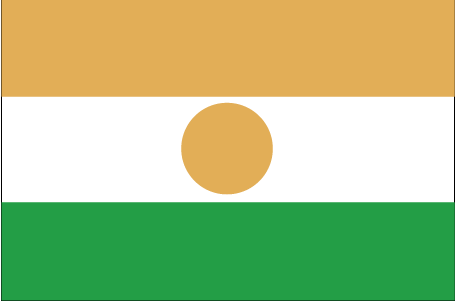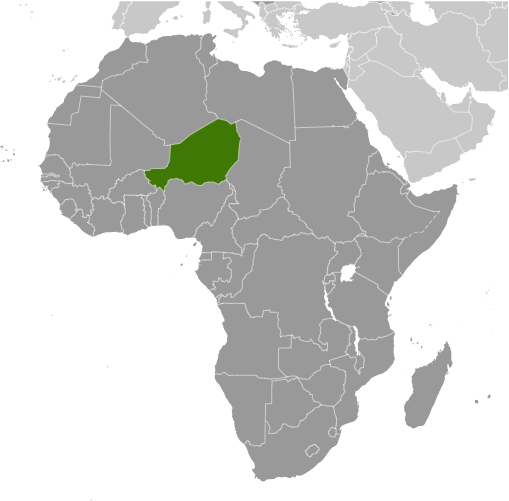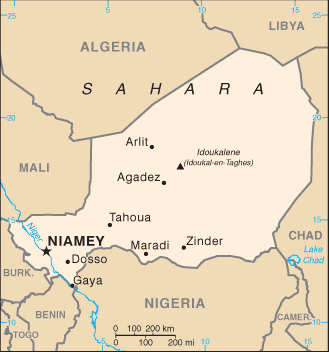Niger became independent from France in 1960 and experienced single-party and military rule until 1991, when Gen. Ali SAIBOU was forced by public pressure to allow multiparty elections, which resulted in a democratic government in 1993. Political infighting brought the government to a standstill and in 1996 led to a coup by Col. Ibrahim BARE. In 1999, BARE was killed in a counter coup by military officers who restored democratic rule and held elections that brought Mamadou TANDJA to power in December of that year. TANDJA was reelected in 2004 and in 2009 spearheaded a constitutional amendment that would allow him to extend his term as president. In February 2010, a military coup deposed TANDJA, immediately suspended the constitution and dissolved the Cabinet, and promised that elections would be held following a transitional period of unspecified duration. Niger is one of the poorest countries in the world with minimal government services and insufficient funds to develop its resource base. The largely agrarian and subsistence-based economy is frequently disrupted by extended droughts common to the Sahel region of Africa. A predominately Tuareg ethnic group emerged in February 2007, the Nigerien Movement for Justice (MNJ), and attacked several military targets in Niger's northern region throughout 2007 and 2008. Successful government offensives in 2009 limited the rebels' operational capabilities.
Population
15,878,271 (July 2010 est.)
Country comparison to the world: 62
Nationality
Noun:Nigerien(s)
Adjective:Nigerien
Ethnic groups
Haoussa 55.4%, Djerma Sonrai 21%, Tuareg 9.3%, Peuhl 8.5%, Kanouri Manga 4.7%, other 1.2% (2001 census)
Religions
Muslim 80%, other (includes indigenous beliefs and Christian) 20%
Languages
French (official), Hausa, Djerma
Country Name
Conventional long form:Republic of Niger
Conventional short form:Niger
Local long form:Republique du Niger
Local short form: Niger
Government Type
republic
Capital
Name:Niamey
Geographic coordinates:13 31 N, 2 07 E
Time difference:UTC+1 (6 hours ahead of Washington, DC during Standard Time)
Administrative divisions
8 regions (regions, singular - region) includes 1 capital district* (communite urbaine); Agadez, Diffa, Dosso, Maradi, Niamey*, Tahoua, Tillaberi, Zinder
Independence
3 August 1960 (from France)
National Holiday
Republic Day, 18 December (1958)
Constitution
adopted 18 July 1999
Legal system
based on French civil law system and customary law; has not accepted compulsory ICJ jurisdiction
Suffrage
18 years of age; universal
Executive branch
Chief of state:Salou DJIBO, chairman of the Supreme Council for the Restoration of Democracy, and a leader of the military coup that deposed President Mamadou TANDJA on 18 February 2010
Head of government:Prime Minister Mahamadou DANDA (since 19 February 2010); appointed by the president and shares some executive responsibilities with the president
Cabinet:26-member Cabinet appointed by the president (Cabinet dissolved following the 18 February 2010 coup)
(For more information visit the World Leaders website)
Elections:president elected by popular vote for a five-year term (eligible for a second term); second round of election last held on 4 December 2004 (no presidential election currently scheduled)
Election results:Mamadou TANDJA reelected president; percent of vote - Mamadou TANDJA 65.5%, Mahamadou ISSOUFOU 34.5%
Legislative branch
unicameral National Assembly (113 seats; members elected by popular vote to serve five-year terms)
Elections:last held on 20 October 2009 (next to be held in 2014)
Election results:percent of vote by party - NA; seats by party - MNSD 76, RSD 15, RDP 7, PNA-Alouma 1, Alkalami 1, Nigerien Party of the Masses for Labor 1, independents 12
Judicial branch
State Court or Cour d'Etat; Court of Appeals or Cour d'Appel
Political Parties and Leaders
Alkalama; Democratic and Social Convention-Rahama or CDS-Rahama [Mahamane OUSMANE]; National Movement for a Developing Society-Nassara or MNSD-Nassara [Hama AMADOU]; Niger Social Democratic Party or PSDN; Nigerien Alliance for Democracy and Social Progress-Zaman Lahiya or ANDP-Zaman Lahiya [Moumouni DJERMAKOYE]; Nigerien Party for Autonomy or PNA-Alouma [Sanousi JACKOU]; Nigerien Party for Democracy and Socialism or PNDS-Tarrayya [Issifou MAHAMADOU]; Nigerien Party of the Masses for Labor; Nigerien Progressive Party or PPN-RDA; Rally for Democracy and Progress or RDP-jama'a [Hamid ALGABID]; Social and Democratic Rally or RSD-Gaskiyya [Cheiffou AMADOU]
Political pressure groups and leaders
The Nigerien Movement for Justice or MNJ, a predominantly Tuareg rebel group
International organization participation
ACP, AfDB, AU, ECOWAS, Entente, FAO, FZ, G-77, IAEA, IBRD, ICAO, ICCt, ICRM, IDA, IDB, IFAD, IFC, IFRCS, ILO, IMF, Interpol, IOC, IOM, ITSO, ITU, ITUC, MONUC, NAM, OIC, OIF, OPCW, UN, UNCTAD, UNESCO, UNIDO, UNMIL, UNOCI, UNWTO, UPU, WADB (regional), WAEMU, WCO, WFTU, WHO, WIPO, WMO, WTO
Diplomatic representation in the US
Chief of mission:Ambassador Aminata Djibrilla Maiga TOURE
Chancery: 2204 R Street NW, Washington, DC 20008
Telephone:[1] (202) 483-4224 through 4227
FAX:[1] (202)483-3169
Diplomatic representation from the US
Chief of mission:Ambassador Bernadette M. ALLEN
Embassy:Rue Des Ambassades, Niamey
Mailing address:B. P. 11201, Niamey
Telephone:[227] 20-72-26-61 thru 64
FAX:[227] 20-73-31-67
Flag description
three equal horizontal bands of orange (top), white, and green with a small orange disk (representing the sun) centered in the white band
note: similar to the flag of India, which has a blue spoked wheel centered in the white band










